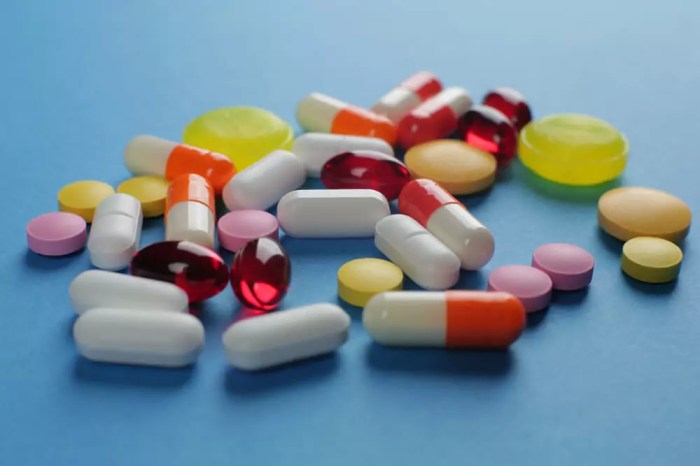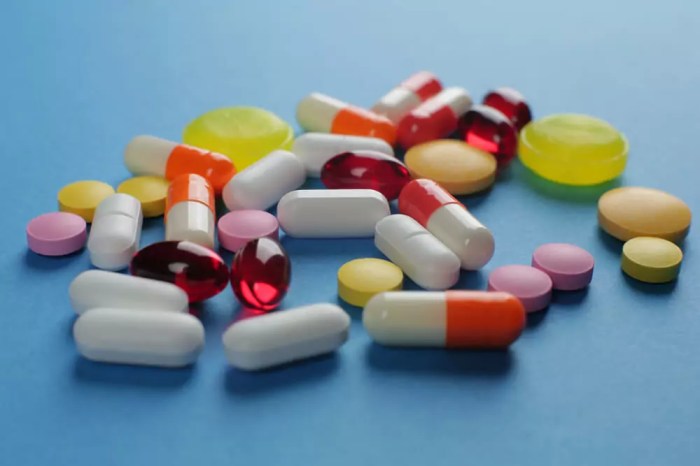Prescription and OTC drugs are a crucial part of modern healthcare, impacting countless lives daily. This comprehensive guide delves into the intricacies of these medications, from their differing regulations and approval processes to the potential side effects and interactions. We’ll explore the responsibilities of consumers and the pharmaceutical industry, the various medical uses, and emerging trends in drug development.
Get ready for a deep dive into the world of prescription and over-the-counter medications.
We’ll cover everything from the simple act of reading labels to the complex processes of drug development, highlighting the importance of responsible use and safe handling practices. Understanding the nuances of these medications empowers informed decisions, fostering better health outcomes for individuals and communities.
Overview of Prescription and OTC Drugs
Prescription and over-the-counter (OTC) drugs play crucial roles in modern healthcare, addressing a wide range of health conditions. Understanding the differences between these drug categories is essential for responsible use and informed decision-making. This overview will clarify the distinctions in regulations, approval processes, typical uses, and potential side effects.Prescription drugs are medications that require a physician’s order before they can be dispensed.
This stringent regulatory process is designed to ensure safety and efficacy, and to prevent misuse. Over-the-counter (OTC) drugs, in contrast, are available without a prescription and are generally considered safe for self-treatment of minor ailments.
Prescription Drug Regulations and Approval
The process for approving prescription drugs is rigorous and multi-phased. Extensive testing and clinical trials are conducted to assess both the safety and effectiveness of the drug candidate. These trials involve various groups of patients and often span multiple years. Regulatory agencies, such as the FDA in the United States, evaluate the data meticulously to ensure the drug meets established safety standards and effectiveness criteria.
A drug’s potential side effects are also carefully monitored and documented throughout the testing process.
OTC Drug Regulations and Approval
OTC drugs, unlike prescription medications, are generally subject to less stringent regulations. However, these drugs are still subject to stringent requirements before they can be sold to the public. The FDA approves OTC drugs for specific uses, and manufacturers must provide evidence of the drug’s safety and effectiveness for those intended uses. The labeling of OTC drugs must clearly indicate the intended use, dosage instructions, potential side effects, and precautions.
Common Uses and Potential Side Effects
Prescription drugs are often used to treat serious conditions requiring a tailored approach, such as managing chronic illnesses or addressing severe symptoms. For instance, medications for high blood pressure, diabetes, or cancer fall into this category. Potential side effects can vary widely depending on the specific drug and individual factors. Some common prescription drugs may cause gastrointestinal upset, dizziness, or allergic reactions.OTC medications are typically used to alleviate minor ailments like headaches, colds, or indigestion.
Common OTC drugs include pain relievers like ibuprofen or acetaminophen, cold remedies, and allergy medications. Potential side effects of OTC drugs are generally less severe than those associated with prescription medications, but they can still occur. For example, taking too much acetaminophen can cause liver damage.
Comparison of Prescription and OTC Drugs
| Drug Type | Intended Use | Dosage | Potential Side Effects |
|---|---|---|---|
| Prescription | Treatment of serious illnesses, management of chronic conditions | Typically prescribed by a physician, varies significantly depending on the drug and patient’s condition. | Can range from mild (e.g., nausea) to severe (e.g., allergic reactions, organ damage). Individual responses vary. |
| OTC | Relief of minor ailments, self-treatment | Generally, dosages are standardized and listed on the packaging. | Usually milder than prescription drugs, but still can include allergic reactions, stomach upset, or other adverse effects. Following dosage instructions is critical. |
Consumer Safety and Responsibilities

Taking responsibility for your health and well-being involves understanding how to use prescription and over-the-counter (OTC) medications safely. This includes comprehending instructions, storage practices, and potential interactions to prevent adverse effects. Proper disposal of these medications is also crucial for environmental protection and to prevent misuse.Careful attention to medication use is paramount. Misuse can lead to significant health problems, from minor discomfort to severe complications.
By following the guidelines Artikeld here, you can ensure responsible and safe medication use.
Importance of Reading Labels Carefully for OTC Drugs
Understanding the instructions and warnings on OTC drug labels is critical. These labels provide essential information about the drug’s intended use, dosage, potential side effects, and precautions. Carefully reading these details ensures proper use and minimizes the risk of unintended consequences. Misinterpreting instructions or ignoring warnings can lead to adverse reactions or complications.
Best Practices for Safely Storing Prescription and OTC Medications
Proper storage is essential for maintaining medication efficacy and preventing accidental ingestion, especially by children or pets. Store medications in a cool, dry place, away from direct sunlight and extreme temperatures. Keep them in their original containers to maintain the integrity of the product and avoid misidentification. Using child-resistant containers is crucial to prevent accidental access by young children.
The storage environment should be inaccessible to pets as well.
Risks of Mixing Different Medications
Mixing different medications, whether prescription or OTC, can lead to unexpected and potentially harmful interactions. Some medications can amplify or counteract the effects of others, potentially leading to adverse reactions or diminished effectiveness. Always consult with a healthcare professional or pharmacist before combining medications, even seemingly innocuous ones. A pharmacist can assess potential interactions based on your specific medical history and the medications you are taking.
Potential Dangers Related to Improper Use of Prescription and OTC Drugs
Improper use of prescription and OTC drugs can lead to a variety of adverse health effects. These include allergic reactions, overdose, organ damage, and even death. Taking more or less than the prescribed dosage can have detrimental effects, and using expired medications can also be dangerous. Combining medications without proper guidance can have serious consequences. Mixing different types of medication can result in unpredictable reactions.
Significance of Proper Disposal Methods for Both Types of Drugs
Proper disposal of unused or expired medications is crucial for environmental protection and public safety. Improper disposal can lead to contamination of water sources and pose risks to wildlife. Moreover, leaving unused medications accessible can potentially lead to accidental misuse, especially by children or those with substance use disorders. It’s vital to ensure that these drugs are not readily available to anyone who shouldn’t take them.
Prescription and OTC drugs are a common part of modern healthcare, offering a wide range of benefits. However, when dealing with specific conditions like diarrhea, understanding the options available, from over-the-counter remedies to prescription medications, is crucial. For a comprehensive guide on diarrhea relief, check out this helpful resource on diarrhea relief OTC and prescription medications.
Ultimately, choosing the right approach to managing your health requires careful consideration of both OTC and prescription drug options.
Disposal Methods for Various Types of Medications
| Medication Type | Disposal Method |
|---|---|
| Prescription drugs | Return to pharmacy or use a drug take-back program. |
| OTC drugs | Mix with an undesirable substance like coffee grounds or kitty litter, then place in a sealed container and discard in the trash. |
| Liquid medications | Mix with an undesirable substance like coffee grounds or kitty litter, then place in a sealed container and discard in the trash. |
| Capsules/tablets | Mix with an undesirable substance like coffee grounds or kitty litter, then place in a sealed container and discard in the trash. |
| Patches | Remove from skin and place in a sealed container. Dispose of in the trash. |
Pharmaceutical Industry Practices
The pharmaceutical industry, a vital component of healthcare, involves intricate processes from research and development to the final dispensing of medications. Understanding these practices is crucial for consumers to make informed decisions about their health and treatment options. This section delves into the roles of key players, the rigorous processes behind new drug approvals, and the regulatory oversight that ensures patient safety.The journey of a new drug from laboratory to pharmacy is a complex one, involving numerous steps and stakeholders.
Each step is meticulously planned and executed to ensure safety and efficacy. This journey involves significant investment, scientific rigor, and careful adherence to regulations.
Roles of Pharmacists and Physicians
Pharmacists play a critical role in the dispensing and management of medications. They are trained to understand drug interactions, potential side effects, and proper dosage instructions. Physicians, on the other hand, are responsible for diagnosing conditions and prescribing the appropriate medications based on their clinical judgment and understanding of the patient’s medical history. The collaborative effort between these two professionals ensures that patients receive safe and effective treatments.
New Drug Development Processes
The process of bringing a new drug to market is lengthy and demanding. It involves several stages, each requiring substantial research and rigorous testing. This lengthy process is essential for ensuring the safety and efficacy of the drug.
Importance of Clinical Trials
Clinical trials are crucial for evaluating the safety and efficacy of both prescription and over-the-counter (OTC) drugs. These trials involve human subjects and are designed to assess the drug’s effects under various conditions. Data from these trials provides critical information for regulatory agencies to determine the drug’s suitability for the market. The results are carefully analyzed to ensure that the drug’s benefits outweigh any potential risks.
Regulatory Bodies Involved in Drug Approvals
Several regulatory bodies oversee the approval of prescription and OTC drugs. These agencies ensure that the drugs meet safety and efficacy standards before they are made available to the public. The most prominent example is the Food and Drug Administration (FDA) in the United States, which plays a pivotal role in this process.
Stages of Drug Development
The development of a new drug is a multi-stage process. Each stage involves specific tasks and requirements, moving from basic research to eventual approval and market release.
| Stage | Description | Regulatory Body (Example) |
|---|---|---|
| Preclinical Research | Initial laboratory and animal studies to assess the drug’s safety and potential effectiveness. | FDA (US) |
| Clinical Trials (Phase 1) | Small-scale studies in healthy volunteers to evaluate safety, dosage, and potential side effects. | FDA (US) |
| Clinical Trials (Phase 2) | Larger studies in patients with the target condition to assess efficacy, dosage, and further potential side effects. | FDA (US) |
| Clinical Trials (Phase 3) | Large-scale studies in a diverse group of patients to confirm efficacy, monitor side effects, and compare to existing treatments. | FDA (US) |
| New Drug Application (NDA) Submission | Submission of data and information from clinical trials to the regulatory agency for review. | FDA (US) |
| Regulatory Review and Approval | Thorough evaluation of the submitted data by the regulatory agency to determine if the drug is safe and effective. | FDA (US) |
| Post-Market Surveillance | Monitoring the drug’s safety and efficacy after it is released to the public. | FDA (US) |
Drug Interactions and Side Effects
Understanding drug interactions and potential side effects is crucial for safe medication use. Many medications, both prescription and over-the-counter (OTC), can interact with each other, sometimes leading to unexpected and potentially harmful consequences. Being aware of these interactions and communicating all medications to your healthcare providers is vital for maintaining health and well-being.Knowing how your body reacts to various drugs is key to managing your health effectively.
This section will explore the importance of understanding drug interactions, the significance of comprehensive medication disclosure, and the factors that influence individual responses to medications.
Potential Drug Interactions
Understanding how different medications can interact is essential for responsible use. Prescription drugs, over-the-counter medications, supplements, and even herbal remedies can interact in complex ways. A medication interaction can occur when one drug alters the way another drug is metabolized or absorbed by the body. This can either increase or decrease the effectiveness of the interacting drugs.
Importance of Communicating All Medications to Healthcare Providers
Open communication with healthcare providers about all medications, including prescriptions, OTC drugs, vitamins, supplements, and herbal remedies, is paramount. This comprehensive disclosure allows healthcare professionals to assess potential drug interactions and adjust treatment plans accordingly. Failure to disclose all medications can lead to unintended consequences, including adverse drug reactions or treatment inefficiencies. For example, a patient taking a blood thinner and an over-the-counter pain reliever might not realize the potential for increased bleeding risk.
Conditions Increasing Risk of Adverse Reactions
Certain medical conditions can increase the risk of adverse reactions to medications. Pre-existing conditions like liver or kidney disease, heart problems, or diabetes can impact how the body processes drugs. Age can also play a role, as the body’s ability to metabolize medications may change with age. Individuals with allergies to certain substances or medications are also at higher risk of adverse reactions.
For example, someone with a known allergy to penicillin might experience a severe allergic reaction if exposed to a medication containing penicillin.
Table of Common Drug Interactions, Prescription and otc drugs
| Drug A | Drug B | Potential Consequences |
|---|---|---|
| Warfarin (blood thinner) | Aspirin (pain reliever) | Increased risk of bleeding |
| Certain antibiotics | Antacids | Reduced antibiotic absorption |
| Some antidepressants | Alcohol | Increased risk of drowsiness and other adverse effects |
| Calcium channel blockers | Grapefruit juice | Increased blood levels of the calcium channel blocker, potentially leading to adverse effects |
Common Side Effects of Medications
Understanding potential side effects of medications, both prescription and OTC, is crucial for patient safety. Side effects can range from mild discomfort to severe reactions. It’s important to note that not everyone experiences the same side effects, and the severity can vary.
Prescription and over-the-counter (OTC) drugs can be really helpful, but it’s crucial to understand their roles. Knowing the difference between a concussion and a traumatic brain injury (TBI) is also important, as proper treatment depends on the specific type of injury. For example, understanding the nuances of these injuries is vital to knowing which medications are appropriate, and when.
Learning more about this crucial distinction can be found in this informative article on the difference between concussions and traumatic brain injuries. Ultimately, a clear understanding of both the different types of injuries and the available medications helps you make informed decisions about your health and well-being, when considering prescription and OTC drugs.
Table of Medications and Potential Side Effects
| Medication Category | Example Medication | Potential Side Effects |
|---|---|---|
| Antihistamines | Benadryl | Drowsiness, dizziness, dry mouth |
| Pain Relievers | Ibuprofen | Stomach upset, nausea, headache |
| Blood Pressure Medications | ACE Inhibitors | Dizziness, lightheadedness, cough |
| Antibiotics | Penicillin | Nausea, vomiting, diarrhea, allergic reactions |
Medical Uses and Applications

Prescription and over-the-counter (OTC) medications play vital roles in modern healthcare, addressing a wide range of health conditions. Understanding their specific applications and benefits is crucial for informed decision-making about personal health and treatment. This section delves into the diverse medical conditions where these medications are indispensable, highlighting their respective benefits and roles in managing various illnesses.Prescription medications are often required for conditions that necessitate precise dosage and therapeutic effects, while OTC medications are typically safe and effective for milder ailments.
Both categories, however, contribute to improved health outcomes when used appropriately.
Prescription and over-the-counter (OTC) medications are a crucial part of managing many health conditions. For example, treating rheumatoid arthritis often involves powerful disease-modifying antirheumatic drugs (DMARDs), like those detailed in this helpful resource on DMARDs for rheumatoid arthritis. Ultimately, understanding the differences between prescription and OTC drugs is key to making informed health decisions.
Prescription Medications for Specific Illnesses
Prescription drugs are essential for treating a multitude of conditions, including chronic diseases and acute illnesses. Their precise chemical composition and dosage are tailored to address specific biological processes and pathways within the body, often achieving therapeutic benefits that OTC medications cannot replicate.
- Cardiovascular Diseases: Prescription medications such as beta-blockers and statins are crucial for managing conditions like hypertension and high cholesterol. These drugs help regulate blood pressure and cholesterol levels, reducing the risk of heart attacks and strokes. For example, patients with high blood pressure often require specific medications to control their blood pressure effectively.
- Diabetes: Prescription medications like insulin and oral hypoglycemics are essential for managing blood sugar levels in individuals with diabetes. These medications help the body regulate glucose metabolism, preventing serious complications associated with uncontrolled diabetes.
- Mental Health Conditions: Prescription medications like antidepressants and anti-anxiety drugs are frequently used to manage various mental health conditions, including depression and anxiety disorders. These medications can help regulate brain chemistry and alleviate symptoms, allowing individuals to lead more fulfilling lives.
- Cancer: Prescription chemotherapy drugs are critical in treating cancer. They target and destroy cancerous cells, often in conjunction with other treatments like surgery and radiation therapy. Different types of cancer require different types of chemotherapy drugs.
Over-the-Counter Medications for Common Ailments
OTC medications are widely used for treating common ailments and symptoms. They often provide rapid relief for mild conditions without the need for a doctor’s prescription. OTC medications are generally considered safe for self-treatment when used according to the instructions on the package.
- Pain Relief: OTC pain relievers like ibuprofen and acetaminophen are commonly used for headaches, muscle aches, and fever. These medications help reduce pain and inflammation in the body.
- Cold and Flu Symptoms: OTC medications like decongestants, cough suppressants, and antihistamines can help alleviate symptoms associated with the common cold and flu. These medications provide temporary relief from congestion, cough, and runny nose.
- Allergies: Antihistamines are OTC medications that help relieve allergy symptoms such as sneezing, itching, and runny nose. These medications block the effects of histamine, a chemical released during allergic reactions.
- Digestive Issues: Antacids and laxatives are OTC medications used to treat various digestive issues, such as heartburn and constipation. These medications help neutralize stomach acid or promote bowel movements, providing relief from discomfort.
Managing Chronic Conditions with Prescription and OTC Medications
Both prescription and OTC medications play a crucial role in managing chronic conditions. Prescription medications are often essential for controlling the underlying disease process, while OTC medications can help alleviate symptoms and improve quality of life.
- Asthma: Prescription inhalers are often used to manage asthma attacks, while OTC medications like antihistamines can help relieve allergy symptoms that can trigger asthma.
- Arthritis: Prescription medications can help reduce inflammation and pain associated with arthritis. OTC pain relievers can help manage symptoms and improve daily function.
- High Blood Pressure: Prescription medications are typically necessary to manage high blood pressure, but lifestyle changes and dietary adjustments, along with OTC supplements, can also help support the treatment.
Comparison of Prescription and OTC Treatments
| Condition | Prescription Treatment | OTC Treatment | Effectiveness |
|---|---|---|---|
| High Blood Pressure | Diuretics, ACE inhibitors | Dietary supplements | Prescription medications are generally more effective in controlling blood pressure. |
| Headache | Triptans (for migraines) | Acetaminophen, ibuprofen | OTC medications are often sufficient for mild headaches. Prescription medications are more effective for severe or chronic headaches. |
| Diabetes | Insulin, oral hypoglycemics | Dietary adjustments | Prescription medications are essential for managing blood sugar levels in diabetes. |
| Allergies | Immunotherapy (in some cases) | Antihistamines | OTC antihistamines provide symptomatic relief for most allergies. Prescription immunotherapy may be necessary for severe allergies. |
Emerging Trends and Future of Medications
The pharmaceutical landscape is constantly evolving, driven by scientific breakthroughs and societal needs. Emerging trends in drug development promise to revolutionize treatment options, leading to more effective and personalized therapies. This shift is impacting everything from the way we discover new drugs to how we deliver them to patients.The future of medications is interwoven with technological advancements. Artificial intelligence, machine learning, and sophisticated biotechnologies are reshaping research and development processes, offering potential solutions for complex health challenges.
These advancements are not just theoretical; they’re already transforming clinical practice, with examples in diagnostics, drug discovery, and treatment optimization.
Emerging Trends in Prescription Drug Development
The pursuit of novel therapies involves a multifaceted approach. New drug targets are identified through advanced research techniques, focusing on specific molecular pathways involved in diseases. This targeted approach aims to maximize efficacy while minimizing adverse effects. The development of innovative drug delivery systems is also a key area of focus. This includes targeted drug delivery to specific tissues or organs, enhancing absorption and bioavailability.
Examples include liposomal formulations and nanoparticles, enabling more precise and effective treatment.
Impact of Technological Advancements on the Pharmaceutical Industry
Technological advancements are dramatically changing the pharmaceutical industry. Machine learning algorithms are accelerating drug discovery by analyzing vast datasets of biological information. This allows for the identification of potential drug candidates more efficiently and precisely. 3D printing is revolutionizing the creation of personalized medicine solutions, allowing for customized drug dosages and formulations. Computational modeling is also crucial, predicting drug behavior in the body and facilitating the optimization of treatment plans.
Potential New Treatment Strategies for Common Conditions
Innovative treatment strategies are emerging for common conditions. Gene therapy, which involves modifying a patient’s genes to correct genetic defects, holds immense potential for treating inherited disorders and some cancers. Immunotherapy, which harnesses the body’s immune system to fight disease, is proving highly effective in certain cancers and autoimmune disorders. Targeted therapies, which precisely target specific molecules or pathways involved in a disease, are also showing promising results in treating various conditions, including some types of cancer and certain cardiovascular diseases.
Role of Personalized Medicine in the Future of Drug Use
Personalized medicine is moving from a concept to a reality, tailoring treatments to individual patient needs. Genetic profiling, which examines an individual’s genetic makeup, can predict how they might respond to certain medications. This allows for the selection of the most appropriate drug and dosage for maximum efficacy and minimal side effects. Further, personalized medicine also includes monitoring patient responses to treatments in real-time.
This approach, along with incorporating patient lifestyle factors, aims to improve treatment outcomes and enhance patient well-being.
Over-the-Counter Access to Prescription Drugs: Potential Benefits and Challenges
The possibility of over-the-counter access to certain prescription drugs raises both benefits and challenges. Increased accessibility could improve patient convenience and affordability, especially for conditions that do not require immediate medical intervention. However, potential misuse and lack of appropriate medical supervision are important concerns. Stricter regulations and clear guidelines are essential to mitigate these risks. The potential for patient self-medication without proper guidance should be carefully evaluated to ensure public safety.
Future Trends in Drug Development
| Trend | New Technology | Potential Applications |
|---|---|---|
| Targeted Drug Delivery | Nanoparticles, liposomes | Enhanced absorption, reduced side effects, targeted delivery to specific tissues |
| Personalized Medicine | Genetic profiling, bioinformatics | Tailored drug selection, optimized dosages, improved treatment outcomes |
| Gene Therapy | CRISPR-Cas9 technology | Treatment of genetic disorders, cancer |
| Immunotherapy | Monoclonal antibodies, checkpoint inhibitors | Cancer treatment, autoimmune disorders |
| Artificial Intelligence | Machine learning, deep learning | Drug discovery, target identification, personalized treatment plans |
Final Conclusion
In conclusion, prescription and OTC drugs play a significant role in our lives, impacting our health and well-being. From the critical role of healthcare professionals to the responsible choices of consumers, understanding the intricacies of these medications is key to safe and effective use. The journey from initial research to final approval involves intricate processes, highlighting the dedication of the pharmaceutical industry.
This guide has provided a comprehensive overview, empowering readers to navigate the world of medications with greater knowledge and confidence. We hope this information fosters a deeper appreciation for the complexities and significance of prescription and OTC drugs.







